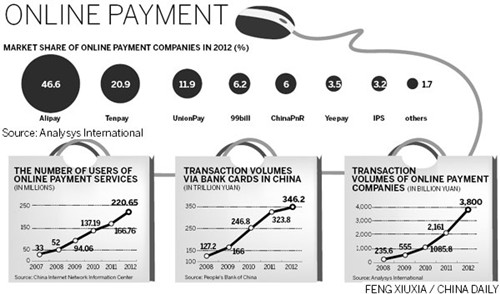
Alibaba Group Holding Ltd, the country's largest e-commerce company, plans to provide financing services to customers. Provided to China Daily

Led by Alipay, a new generation of online 'banks' are now flexing their financial muscles
It's not an easy task to compete with banks, whose sheer size may be too big for latecomers to handle. But there are exceptions.
Third-party payment companies, after a decade of fast development, are providing not only payment services but also services traditionally provided by banks, such as loans.
Among these companies, Alibaba Group Holding Ltd - China's largest e-commerce company - has gone further than others. Alibaba plans to set up Alibaba Small and Micro Financial Services Group to consolidate its online payment and micro loan businesses, and provide financial services for consumers and small and micro enterprises - those with an annual turnover of less than 30 million yuan ($4.8 million).
The company has made it clear that its two main business arms will be e-commerce and financial services based on its huge e-commerce data. The latter is thought to be a challenge to banks and may change the financial industry landscape due to the use of Internet technology and the huge amount of data that records users' history and habits.
"For the past 13 years, Alibaba hasn't thought of challenging anyone, but creating something new instead," Alibaba's Chairman Jack Ma said at an industry forum late March when asked whether his company aims to challenge banks.
"Banks are getting a bit nervous. But I think that getting nervous is good, and it would be strange if they aren't," Ma said.
"If banks weren't nervous, China's small and micro businesses would be nervous," Ma added, hinting that banks fail to provide enough services to help small and micro enterprises raise funds.
Challenge to banks?
Major third-party payment companies in China first appeared around 2004, and they have quickly risen to prominence as the country's e-commerce market grew dramatically over the last decade.
Last year, the total transaction volume processed by third-party payment companies reached 3.8 trillion yuan, an increase of 76 percent year-on-year, according to domestic research company Analysts International.
By contrast, in 2012, the total transaction volume of bank cards in China was 346.2 trillion yuan, according to People's Bank of China.
While the biggest player in the sector, Alipay, which is owned by Alibaba, originally acted only as an escrow between sellers and buyers, third-party payment companies are now offering a wide range of services, such as payment and settlement services, and micro loans.
Alibaba plans to launch a credit payment service for its mobile users, which gives them a certain credit limit based on their Alipay records.
Although banks provide the funds, the service is thought to be similar to a cyber credit card, a further move by third-party payment players to expand in the financial industry.
"I don't think the service will have an impact on the banks' credit card business. In fact, it's complementary as more users' credit histories can be dug out and accumulated for banks' reference," said Hu Xiaoming, Alibaba's vice-president.
The move comes after Alibaba started to extend loans to vendors on its trading websites based on their trading records rather than collateral in 2010.
Around 220,000 small and micro enterprises had received loans from Alibaba as of March, at an average interest rate of about 18.9 percent a year, which is "not low" for small and micro companies, said Hu.
More industry players, not only third-party payment companies but also e-commerce companies, have started providing micro loan services to ease funding problems.
Beijing Jingdong Century Trading Co Ltd, which operates China's second-largest shopping website, and smaller rival Suning Commerce Group Co Ltd both partnered with banks to provide micro loans to their suppliers and distributors, which usually face a shortage of funds due to long payment periods.
With the services, Jingdong and Suning's suppliers and distributors can get funding more easily based on their past credit and account receivables records.
This way of lending by using e-commerce data differs from the traditional way, in which small companies have to provide collateral to banks and sometimes have difficulties meeting the banks' requirements. In addition, banks usually prefer larger companies with lower risks.
"Banks are actually a bit behind. They don't have the key e-commerce data of their customers, and this may prevent them from developing value-added services as their Internet counterparts do," said a vice-president at a major third-party payment company who asked not to be named.
He Qiang, a professor at the Central University of Finance and Economics, said that the expansion of third-party payment and e-commerce companies into payment services may pose a challenge for banks.
"Payments are where banking services start, as clients deposit their money in the banks primarily for the purpose of processing payments, which generates lending and remittance business. And now the online payment companies are taking the same track," he said.

Copyright ©1999-2011 Chinanews.com. All rights reserved.
Reproduction in whole or in part without permission is prohibited.